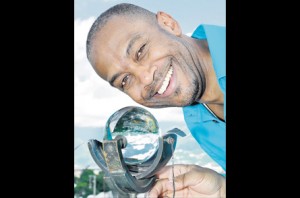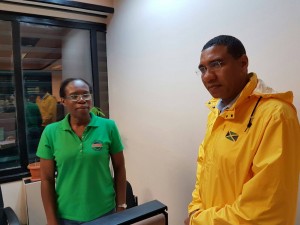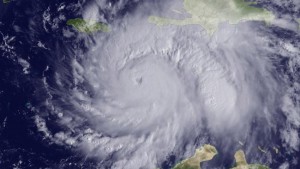
The Uncertain Life and Times of the Jamaican Weather Forecaster
October 5th, 2016
In the wake of Hurricane Matthew – who is still churning around Cuba and giving the Bahamas and Florida the jitters – one thing struck me. Our friends at the Meteorological Office of Jamaica received unjustifiably harsh criticism from the Jamaican public. It is almost as if some Jamaicans felt cheated that they had gone to all the trouble of preparing for the storm, which then did not impact them in the way they expected. What a waste of effort, they said! Or, as a blogger friend put it, “We want our money back!”
One thing that should be abundantly clear from all the discussions on climate change is this: Nothing is certain any more. Our rainy seasons don’t arrive in the same months. We cannot guarantee rain at all, in fact, because droughts are longer. While we may not get as many tropical storms as we used to, the ones that do affect us may be much longer and stronger – as Hurricane Matthew has shown – and they may not arrive at the expected time. Matthew is still a powerful Category Three storm, after all the time he has spent hanging around in the Caribbean.
When we talk about resilience in the context of climate change, we are also talking about the need to endure – and tolerate – this kind of uncertainty. By “we” I mean the general public, that is, that sees and experiences the symptoms of our own man-made crisis. We need to develop this kind of mental and physical stamina; perhaps we should, indeed, develop a kind of thick armor of preparedness that we can put on whenever the need arises. Preparedness is a matter of routine, and we need to “get with the program” as they say, and put on that armor when required to do so. We also need to adapt – and that means change our mental attitudes. I am not speaking of the technical term “adaptation” now, but rather a change of mindset – to an “expect the unexpected” mindset.
In science, there is often no such thing as absolute certainty. I took a look at a scientific article on uncertainty and climate change, and a few phrases jumped out at me: “low confidence,”; “Robust conclusions…are presently not possible…” ; “different global estimates…have variations…”; “substantial ambiguity,”…and so on. This is what scientists are now grappling with: that which was certain, predictable and following the “normal” pattern is now looking wobbly (as Matthew was at times). Technology and the resulting ability to create models or projections of what the weather will look like, has improved by leaps and bounds. This is particularly problematic, I understand, at the regional level.
Let us not forget – there is still a small but persistent chorus of climate deniers and conspiracy theorists, who thrive on uncertainty. As we have seen locally, there are those who are shrugging their shoulders and saying “Ah nuh nutten.” Residents of Port Royal who refused to leave partly based their decision to stay put on the fact that last time they were quite fine (Ah, but last time was last time! And in fact your only access road was blocked for some hours, Port Royalers!) Some believed that officials were exaggerating the severity of Hurricane Matthew and its impact, that their preparedness efforts were intended to score political points. To me, the “prayer warriors,” who suggested that the path of the storm was not predicated on science but on God, did not encourage us to support or have faith in our beleaguered forecasters. Now, of course, they all believe that their prayers actually diverted the passage of Matthew (which, of course, could have wobbled slightly westward and hit us smack in the face!) Evidently, the prayers of the Haitians were not as effective (nor those of the Cubans, Bahamians and Floridians, perhaps) and science had nothing to do with it. Sorry, not buying that.

Head of the Meteorological Service of Jamaica Evan Thompson, with a sunshine recorder. (Photo: Naphtali Junior/Jamaica Observer)
In the face of all of this, our meteorologists back home face an uphill battle at times. No wonder Mr. Evan Thompson – a hard-working public servant and dedicated scientist of some 27 years – looked somewhat nervous at a press briefing last night. And perhaps it’s just as well that the Office of the Prime Minister (with the well-behind-the-scenes Office of Disaster Preparedness and Emergency Management – ODPEM) took the bull by the horns in terms of getting preparedness going. It was an excellent team effort by all the relevant government ministries and agencies.

Prime Minister Andrew Holness, in his waterproof gear, at the ODPEM office while Hurricane Matthew was hanging around. (Photo: Office of the Prime Minister)
So, the Jamaican Government, in my view, took the right actions at the right time. It was nobody’s fault that Matthew took so long to reach us (at one point he actually stopped altogether for a few hours). Again, its unpredictability forced the Government and the forecasters to keep repeating, “Hold on. We’re not past the worst yet. Matthew is moving slowly!” So the whole island remained in a suspended state of animation in what seemed to be an unbearably long weekend. The hours dragged on, and Jamaicans started losing their patience. We need to learn patience, and endurance, and keep the focus – as Government agencies did, to their credit.
A 2014 article in the UK Guardian by Adam Corner (Research Director for the Climate Outreach & Information Network (COIN) and an Honorary Research Fellow in the School of Psychology, Cardiff University) notes:
The precautionary principle (slippery concept that it is), rests on the idea that less-than-complete knowledge is no reason for inaction. But spreading doubt, playing down the scientific consensus, and focusing obsessively on uncertainties has been the central strategy of climate skeptics, following the helpful example of the tobacco industry before them.
In other words, we must still take action, even if we are not sure how things will work out. Now, if the Meteorological Service of Jamaica (the Met Office) had not erred on the side of caution, very sensibly, the Jamaican Government would not have responded in the way it did. Would the Jamaican public, therefore, have taken Matthew seriously? One suspects not. It is a question of communication – and communication is vital at a time of disaster and uncertainty. This is something that both ODPEM and the Met Office need to keep in mind for the future; they need a constant and effective social media presence (and for those without Internet, why not have a phone texting system to alert citizens?)
My suggestion would be, for the future: Let our weather forecasters do their job, to the best of their ability.
Meanwhile, I leave you with this quote from the I Ching, or Book of Changes:
Remain steady, and allow the world to shape itself.
Tags: Bahamas, Caribbean, Climate Change, Cuba, drought, Evan Thompson, Florida, Hurricane Matthew, Meteorological Service of Jamaica, ODPEM, Office of Disaster Preparedness and Emergency Management, Office of the Prime Minister, Port Royal, rainy season, resilience, social media, tropical storms, uncertainty
The Gleaner reserves the right not to publish comments that may be deemed libelous, derogatory or indecent.
To respond to The Gleaner please use the feedback form.
4 Responses to “The Uncertain Life and Times of the Jamaican Weather Forecaster”
- We Are the Zoomers
- Living Online with Humans and Birds: NAOC 2020
- Human Trafficking and the Problem of Public Education
- Down Memory Lane
- Are We Ready to Recover from COVID-19?
- Road Safety Matters: Is Your Vehicle Safe?
- Sexual Harassment, Me Too, and the Minister’s Disturbing Giggle
- The Vulnerable Senior Citizens, Private Care Homes and COVID-19
- A Muddle Over Masks
- Here is Something Life-Saving You Can Do: Give Blood!




We also need to make physical changes, i.e. do things differently. That means the State must act better in carrying out tasks like infrastructure maintenance, service delivery (e.g. regular and good quality garbage collection), and as you mentioned, improved communications. It also includes the State implanting and enforcing laws and rules that better protect us all. All of this requires enormous effort, especially in getting away from old ways. The public must also ‘do better’ in how it treats the country, and understand that each person simply doing what makes him or her happy is NOT community spirited. That goes particularly to how we dispose of garbage, but also the joint responsibility with government of where and how we build dwellings: it cannot be a free-for-all of anywhere and anyway I like.
I fully agree with you. The various State agencies must step up their game – and also this issue of social responsibility that you have raised before is a very important one. Thanks for your comments.
So this is what journalism has come to. There is no author’s name linked to this article and then of course there is no list of his or her qualifications to regurgitate on a a section of unproven global warming failed predictions and theories. Conspiracy theorists? How about the facts that the climate models have been mostly wrong?. How about the fact that the global warming theory has not passed the test of science? What do you do with the many lies and frauds committed in the name of global warming? Ahh well the human mind is so easy to deceive. But that is the way God made us.
Dear John Anthony: Firstly, I am not a journalist but a writer/blogger with an interest in environmental and climate change issues. The name of the blog is “Social Impact with Emma” and my name is Emma Lewis. My main blog is petchary.wordpress.com. No, I am not a scientist. I have attended many meetings and lectures (including those by Physics Professors, who must all be “deceived” too) and done quite a bit of research myself. I am also connected to one local and one regional conservation organization and have supported several others. I guess you are one of those “climate change deniers” and you are entitled to your own view. So no, I do not pretend to be a journalist or a scientist. By the way, is the Paris Agreement a fraud and a hoax too, in your view? (I suppose that’s a rhetorical question, to which you would answer “Yes.” Thank you for your comments.